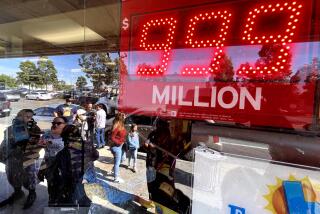Does It Trigger Compulsive Gambling? : Debate Rages on Public Effect of Lottery
- Share via
SACRAMENTO — The state will be closely watching who plays its new lottery, and it’s a safe bet that both gambling critics and supporters will find ammunition in the marketing studies for their endless clash.
Critics such as the National Council on Compulsive Gambling in New York say that the spreading state lotteries are basically a regressive tax on those who can least afford to pay, and that at least 2% of the Californians who discover gambling through the lottery will become compulsive gamblers.
The lottery opponents cite, in part, the sprinkling of studies in lottery states showing that people from the poorest households bought up to half of all weekly lottery tickets and up to nearly two-thirds of the daily-game tickets.
Middle America
Lottery supporters counter by pointing to the majority of studies, which show that most ticket buyers are middle-class and stable.
And California lottery commissioners, who were appointed to make the games successful, have said it is not their business to study the lottery’s ill effects.
Maryland-based Public Gaming Research Institute, which publishes several industry magazines and sponsors conferences of state officials, says recent surveys have shown that the majority of players are older, more educated and more financially secure than critics contend.
One of the studies showed that a typical Washington state lottery player was most likely to be a male who had attended college for at least one year and was in a middle- to upper-income bracket. The most active Washington player was in the 50- to 64-year-old category, with an annual income from $35,000 to $50,000.
Fewer Young People
Meanwhile, people 29 or younger, those with less than eight years of education and those with incomes under $10,000 did not play the lottery in proportion to their share of the population.
A New Jersey study concluded that 82% of lottery players had incomes of $15,000 a year or more. Twenty-two percent had incomes of $40,000 or more annually.
Supporters also say that the lottery does not supply the fast pace and thrills that normally attract compulsive gamblers.
But critics, such as Msgr. Joseph Dunne, president of the National Council on Compulsive Gambling, say there already are as many as 8 million compulsive gamblers in the United States.
Dunne says that all gambling is addictive and that the key to addiction is availability, which the lottery provides.
Social Ills Feared
He says compulsive gambling, in turn, creates social woes such as child abuse, embezzlement, fraud, theft, corruption, absenteeism and suicide. The problems end up costing taxpayers.
The warning signs: betting until your last dollar is gone; borrowing to gamble or to pay gambling debts; allowing gambling to interfere with family welfare; contemplating stealing to finance gambling.
Six of the 22 states where lotteries are legal have set aside a small amount of lottery revenue for treatment of compulsive gambling. California has not, so far.
More to Read
Sign up for Essential California
The most important California stories and recommendations in your inbox every morning.
You may occasionally receive promotional content from the Los Angeles Times.













